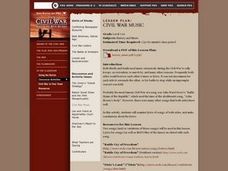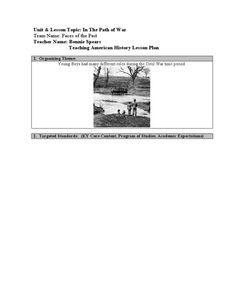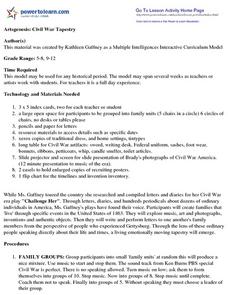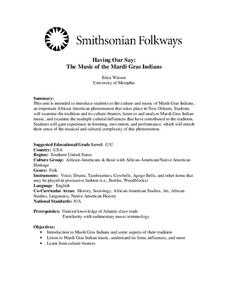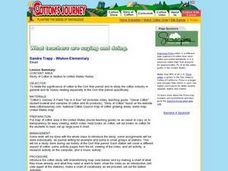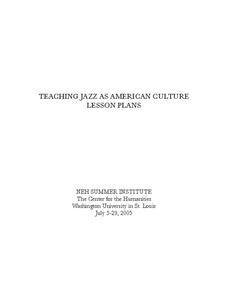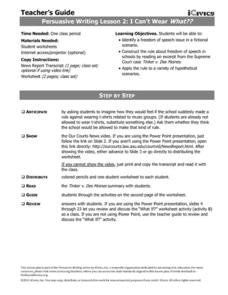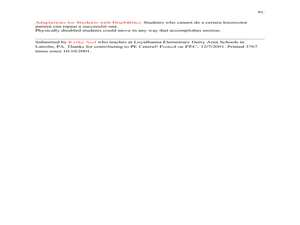National Endowment for the Humanities
Life Before the Civil War
American life before the Civil War was very different from American life today. To show this difference in a full spectrum, learners compare two communities that illustrate the differences between Northern and Southern life. Throughout...
Curated OER
Civil War Music
Students discover how both the North and South used music extensively during the Civil War to rally troops, as recreation, to march by, and many other reasons. They realize that both sides would borrow each other's tunes or lyrics and it...
Curated OER
Faces of the Past: Boys in the Civil War
Students investigate the role of boys during the American Civil War. In this Civil War Research lesson, students study the contributions of young Union and Confederate men to the war effort. Students also make...
Curated OER
Artsgenesis: Civil War Tapestry
Students explore the Civil War and the many emotions that emerged during this era. The teacher arranges students in groups of families and prepares them to simulate typical responses during this era. The Civil War and Gettysburg is...
Curated OER
Who Fought for the Union?
Learners read New York Times articles, letters, and listen to songs written from a soldier's perspective during the Civil War in order to understand who was fighting in the Union Army. This is a great lesson, complete with weblinks,...
Curated OER
Cover the Music
Young scholars explore U.S. history by listening to musical pieces in class. In this Civil War era instructional activity, students discuss the types of musical instruments that were available to soldiers during the war and the themes of...
Smithsonian Institution
The Music of the Mardi Gras Indians
The traditions, costumes, and the music of the Mardi Gras Indians, African-Americans and those with African American or Native American Heritage are the focus of a unit that introduces class members to a little-known group that...
Curated OER
The Civil War
Students examine the events of the Civil War. Using the internet, they research one aspect of the war of interest to them. In groups, they create a hyperstudio stack which they present to their classmates showing the information they...
Alabama Department of Archives and History
Strange Fruit: Lynching in America
To continue their study of the Civil War, Reconstruction, and the beginning of the civil rights movement, class members watch the YouTube video of Billie Holiday singing "Strange Fruit" as an introduction to an examination of...
Curated OER
Cotton Journey
Students use "Cotton Journey-A Field Trip In A Box" kit to relate the significance of cotton to the Civil War period and to study the cotton industry in general.
Washington University in St. Louis
Teaching Jazz as American Culture
Jazz and the City, Jazz and the Civil Rights Movement, Jazz and Gender, Jazz and Literature, Jazz and the Arts, Jazz and Film. Here's a packet of unit plans organized around themes that reflect American culture. Each unit examines how...
iCivics
I Can’t Wear What?
Can schools ban t-shirts picturing musical groups or bands? Your young citizens will find out with this resource, which includes a summary of a United States Supreme Court case from the 1960s about a similar dispute over students wearing...
Curated OER
1862 MARYLAND CAMPAIGN, AMERICAN CIVIL WAR
Students explain why General Robert E. Lee decided to invade Maryland in September 1862; review the major events of the Maryland Campaign of 1862; describe the major events of the three phases of the Battle of Antietam; and assess the...
Curated OER
Art -- The Secret to Freedom
Fourth graders create a coded message in a quilt. In this art lesson students demonstrate the communication used by the Underground Railroad. Students work in a group to make a quilt with a code in it.
Curated OER
Women's Roles in Post World War II
Students discuss the role of women before, during, and after World War II. In this equality instructional activity, students plan how to make the workforce more equal among men and women after World War II. They research World War II and...
Curated OER
Gettysburg Movie
Students create a movie that includes both sound and pictures of the Gettysburg Address using iMovie, digital cameras, and copies of the Gettysburg Address. Extensive examples of student works are given.
CHPCS
The United States in the 1920s: The New Negro Movement and the Harlem Renaissance
Music, writing, and activism all tell the story of history! The resource uses these elements and more in a presentation to discuss the Jazz Age and Harlem Renaissance. Your class views biographies, discusses important events, and...
Roy Rosenzweig Center for History and New Media
Yankee Doodle: How Has It Changed over Time?
Grab your feathers and your hat! And perhaps some macaroni! It's time to investigate the evolution of "Yankee Doodle Dandy." Groups do a close reading of sheet music covers, lyrics, and even YouTube videos to see how this political song...
Curated OER
A Picture's Worth a Thousand Notes
Students listen to classical music and create a listening map for each piece. In this classical music lesson plan, students select a piece of classical music and create a visual map for the piece. Students set their pictures to music in...
Library of Congress
The Harlem Renaissance
The Harlem Renaissance brought forth many American art forms including jazz, and the writings of Zora Neale Hurston and Langston Hughes. Using a carefully curated set of documents from the Library of Congress, pupils see the cultural...
Mississippi Whole School Initiative
Dream Big...With Your Eyes Wide Open
For many people, Barack Obama's presidency was the next step in Martin Luther King, Jr's dream of America's future. Explore the dreams of Americans past and present, as well as the young Americans in your class, with a set of activities...
Curated OER
Teaching Fundamental Movement
Learners perform fundamental movement activities for flexibility and motor skills. In this movement lesson plan, students perform physical activity for all grade levels.
Annenberg Foundation
Egalitarian America
What does a true American represent? Scholars investigate the equal rights era of the 1960s and 1970s in the 20th installment of a 22-part series on American history. Using photographic, magazine, written, and video evidence, groups...
Association for Library Service to Children
Summer Reading List Grades 6-8
What better activity is there for summer than reading? Provide your pupils with 25 book ideas for their summer reading pursuits. A variety of different genres are represented on this list, and each book is paired with publication...

